Sure or not? I can count with my five fingers.Land, they have. People, they have. Friends, they have. What do they lack?
-
IP addresses are NOT logged in this forum so there's no point asking. Please note that this forum is full of homophobes, racists, lunatics, schizophrenics & absolute nut jobs with a smattering of geniuses, Chinese chauvinists, Moderate Muslims and last but not least a couple of "know-it-alls" constantly sprouting their dubious wisdom. If you believe that content generated by unsavory characters might cause you offense PLEASE LEAVE NOW! Sammyboy Admin and Staff are not responsible for your hurt feelings should you choose to read any of the content here. The OTHER forum is HERE so please stop asking.
You are using an out of date browser. It may not display this or other websites correctly.
You should upgrade or use an alternative browser.
You should upgrade or use an alternative browser.
SG in ménage à trois with US and China for next 30 years
- Thread starter LITTLEREDDOT
- Start date
SG should also expect Georgie Boy to talk cock for up to 30 years.
Singapore hopes United States will deepen ties with Asia-Pacific: PM Lee
1 of 6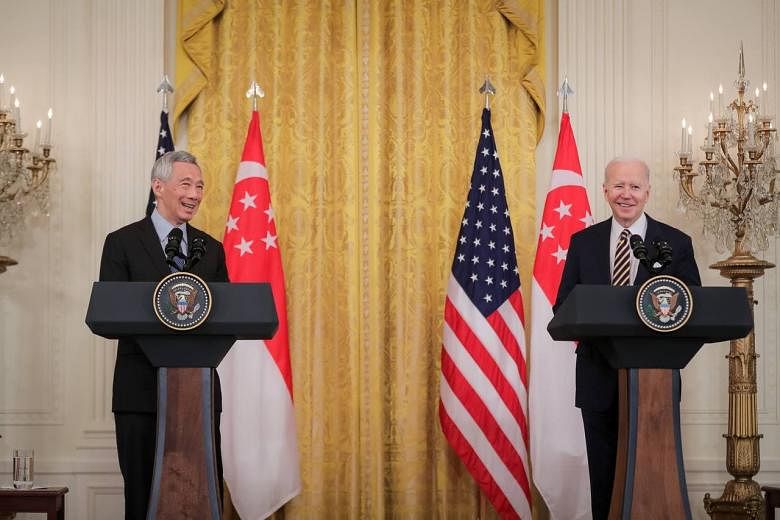
Prime Minister Lee Hsien Loong (left) and US President Joe Biden at a press conference in the White House, on March 29, 2022. ST PHOTO: GAVIN FOO

Charissa Yong
US Correspondent
Mar 30, 2022
WASHINGTON - Singapore hopes that the United States, amid its many preoccupations, will continue to deepen its relationship with countries in the Asia-Pacific, Prime Minister Lee Hsien Loong said on Tuesday (March 29) during his meeting with US President Joe Biden.
President Biden said that even as his administration addresses the ongoing Ukraine crisis, it is committed to implementing its Indo-Pacific strategy, and he is looking forward to hosting Asean leaders in Washington for a special summit soon.
"Singapore deeply appreciates President Biden's leadership in strengthening US engagement of the region," said PM Lee.
"We welcome his intention to host an Asean-US Special Summit here soon. It's a strong affirmation of US commitment to South-east Asia and to Asean centrality."
Speaking to reporters at the start of their meeting at the White House, both leaders discussed America's commitment to the Asia-Pacific and acknowledged that their meeting came amid a critical moment in world affairs, with Mr Biden calling Russia's invasion of Ukraine an urgent threat to both Europe and the Indo-Pacific.
"It's attacking the core tenets of the rules-based international order, (that) borders can't be changed by force, and all nations large and small are equal and sovereign," said President Biden.
He thanked PM Lee for Singapore's "principled leadership in supporting the people of Ukraine", a reference to the sanctions and export restrictions that Singapore has imposed on Moscow to constrain Russia's capacity to conduct war against Ukraine.
"I know it's not easy, but I want to thank you for it. You're a man of principle and you've stepped up every time you had to," said Mr Biden, adding later that Singapore punched way above its weight.
Mr Biden reaffirmed America's commitment to the region, while PM Lee said he hoped the US could substantially deepen its relationships with Asean countries and others, including China.
In doing so, the US would foster the peace, stability and security of the region, as it has done since World War II, he added.
He said that the relationship between the US and Asean is "an engagement which is important to the US because it helps the US to be present in the Asia-Pacific, and to deepen its relations with many friends, and to strengthen its strategic interests in the region".
The two leaders also praised the strength of defence and economic ties between their two countries, with PM Lee noting Singapore's status as America's only Major Security Cooperation Partner.
"Singapore is a very good partner of the United States," said PM Lee, who wore a lapel pin with the US and Singapore flags on it. "Our relations are doing very well, economically as well as in the security and defence realms. And they prosper and grow and venture into new areas, continually."
The Prime Minister's Office said both leaders reaffirmed the robust, enduring and multifaceted Singapore-US partnership and welcomed new areas of cooperation, including in infrastructure development, cyber security and space.
"PM Lee welcomed President Biden's strong commitment to engage the region and Asean. Both leaders exchanged views on international and regional developments, including the crisis in Ukraine, and reaffirmed their shared commitment to a stable, rules-based global order," it added.
At a joint press conference after the meeting, PM Lee said Singapore is a staunch supporter of international law and the United Nations Charter, which prohibits acts of aggression against a sovereign state, and this is why it has strongly condemned the unprovoked attack by Russia on Ukraine.
"The sovereignty, political independence, and territorial integrity of all countries, big and small, must be respected. The unprovoked military invasion of a sovereign country under any pretext is unacceptable," he said.
"Our actions are based on the principles that are fundamental to our survival and existence as an independent sovereign nation. We have upheld these principles, and voted in accordance with them at the UN, in successive crises over many decades, involving different countries," he added.
S'pore should prepare for up to 30 years of US-China rivalry: George Yeo
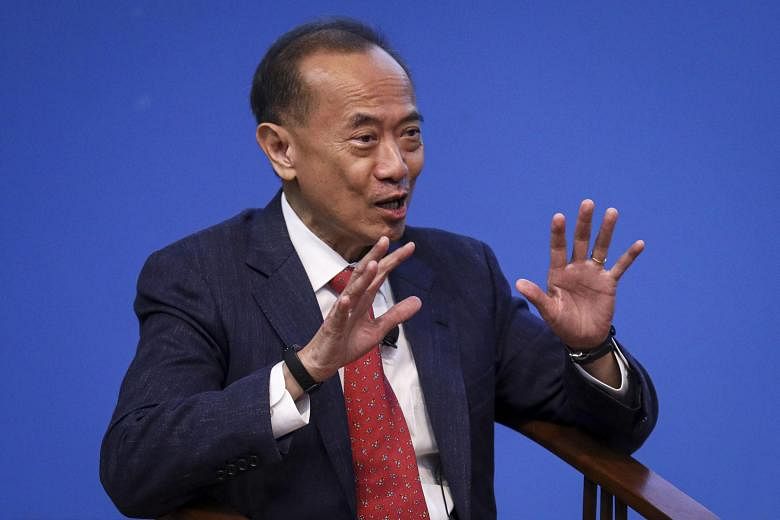
Former foreign minister George Yeo suggested that Singapore work on reconnecting with its South-east Asian neighbours and establishing its own identity. ST PHOTO: FELINE LIM

Justin Ong
Political Correspondent
JAN 11, 2022
SINGAPORE - Singapore should prepare for "easily" up to 30 years of competition between the United States and China, which could take the form of skirmishes off the sea or proxy wars, said former foreign minister George Yeo on Tuesday (Jan 11).
To avoid being caught in between and to maintain sovereignty, he suggested that Singapore work on reconnecting with its South-east Asian neighbours and establishing its own identity - one where being Singaporean means being "bigger" than just a nationality.
Mr Yeo, who is currently a visiting scholar at the Lee Kuan Yew School of Public Policy, was speaking as a panellist at a curtain-raiser for the annual Singapore Perspectives conference organised by the Institute of Policy Studies think-tank.
This year's event, with the theme "City", comprises seven virtual forums on Jan 13 and 17, and a physical conference on Jan 24.
Asked by moderator and ambassador-at-large Chan Heng Chee if he saw Singapore being among the great cities in the region and the world in the next two decades or so, Mr Yeo said that if the Republic can position itself well in a flourishing Asia, its prospects would be bright.
"There's no guarantee because we're in competition with others. There's always the possibility that we may make bad mistakes," he added.
"For example, the current tension between the US and China will mark this period of history and it will go on for years to come… sometimes high tension, sometimes low tension."
Mr Yeo said that if Singapore remains just a city-state, it would find itself frequently between a rock and a hard place.
Singapore thus needs to organically "reroot" itself in the region and become a capital city of Asean, he added, noting Singapore's links to other members of the 10-nation bloc through their sizeable communities here.
Working through Asean, Singapore can better navigate the big powers - not by taking sides, but by leaning "a little to the other side" in the event anyone pushes Singapore too hard.
Mr Yeo said Singapore's leaders must have the foresight to steer the nation away from potential conflict and danger.
"We are part of many networks - the American network, the Chinese network, the Indian network. And every network has to capture us, naturally, so we have to be careful," he cautioned. "We are friendly to everybody, but we are autonomous."
Also taking part in the in-person panel discussion was former chief city planner Liu Thai Ker, though their audience was an online one. Viewers could submit questions - one of which was how Singapore could thrive amid conflicting spheres of influence between China and the US.
Mr Yeo said the challenge for the country - where about three-quarters of the population identify as ethnically Chinese - was not outside but "inside".
"Who are we as Singaporeans?" he asked. "Is Singapore just a facility, a convention centre, a good hotel, a restaurant - or is it something more? Does it stand for values which others are happy to associate with?"
Mr Yeo added: "Singapore is special because our different communities retain their ancestral cultures… and we encourage them to be proud of their ancestral cultures. Our diversity is not based upon everybody curbing themselves to become Singaporean, but everybody being bigger in accepting others who are not like themselves.
"If we can make this happen - that to be Singaporean is to be bigger than what you were when you were in China or India or Indonesia or Thailand… then to be a Singaporean is to become bigger."
Mr Yeo said this, and questions around how Singaporeans relate to one another, was something to think deeply about.
"The more comfortable we are with our own identity, the more open we'll be," he said. "If I know who I am, I can accept you for who you are… So identity is important, and Singapore's identity is complicated because it is made up of constituent identities."
'Re -root'.... sounds like he visit SBF forum to pick the brains of us here....
Yah lah... go grab lease land in Xinjiang from 大哥大中国兄弟们.... become twin city....
Easy to build up the twin city by reuse the LKY genius nation building program.....
1. Grab all 18y.o boys send to Singapore 2 and form SAF2 in Xinjiang .... these boys need jobs in S2.... only army can create instant jobs and instant standby housing buyers there....
2. Build HBD2 to get ready for the boys....
3. With am army of young soldiers any banks will lend constructioj loans if S2 can show nation securities of armed force on that leased land, with option of another 200 years for good behaviour conduct....
4. A S2 with civilian armed force soldiers owned housings can mobilised them in 10 hours even get landlord 大哥 worried...
5. For next 30 years S2 construction economy keep boomming 真不得聊....
Here is the bonus to leaseland in Xinjiang now. The Chinese saying if you build roads the business will follows...
When BRI HSR get better to use for trades between Eastern China to the West, much of the lands on the HRS routes are flatten and chosen.... and determined...
Then build deep sea lanes follow.... with HSR carry cargoes quickly can ship deep land excavator machines to build deep sealanes... alongside HRS routes using solar powered engines cargo ships....
Those orthodox Christianity faith Europeans are nice people, can see from this Rus-Ukr war fiasco if they can dump that annoying orthodox Christianity faith USA from their region....
Tioboh... hope this helps... psst...if you like my bullshit click the like button....
Last edited:
Yeah lah.... see u get fucked by blue camels is fun...'Re -root'.... sounds like he visit SBF forum to pick the brains of us here....
Yah lah... go grab lease land in Xinjiang from 大哥大中国兄弟们.... become twin city....
Easy to build up the twin city by reuse the LKY genius nation building program.....
1. Grab all 18y.o boys send to Singapore 2 and form SAF2 in Xinjiang .... these boys need jobs in S2.... only army can create instant jobs and instant standby housing buyers there....
2. Build HBD2 to get ready for the boys....
3. With am army of young soldiers any banks will lend constructioj loans if S2 can show nation securities of armed force on that leased land, with option of another 200 years for good behaviour conduct....
4. A S2 with civilian armed force soldiers owned housings can mobilised them in 10 hours even get landlord 大哥 worried...
5. For next 30 years S2 construction economy keep boomming 真不得聊....
Here is the bonus to leaseland in Xinjiang now. The Chinese saying if you build roads the business will follows...
When BRI HSR get better to use for trades between Eastern China to the West, much of the lands on the HRS routes are flatten and chosen....
Then build sea lanes follow.... with HSR carry cargoes quickly can ship deep land excavator machines to build sealanes... alongside HRS routes using solar powered engines cargo ships....
Those orthodox Christianity faith Europeans are nice people, can see from this Rus-Ukr if they can dump that annoying orthodox Christianity faith USA from their region....
Tioboh... hope this helps... psst...if you like my bullshit click the like button....
Like my poon pe pe ah....Yeah lah.... see u get fucked by blue camels is fun...









Yeah lah.... see u get fucked by blue camels is fun...Like my poon pe pe ah....








Singapore, US reaffirm defence ties and discuss Russia's invasion of Ukraine
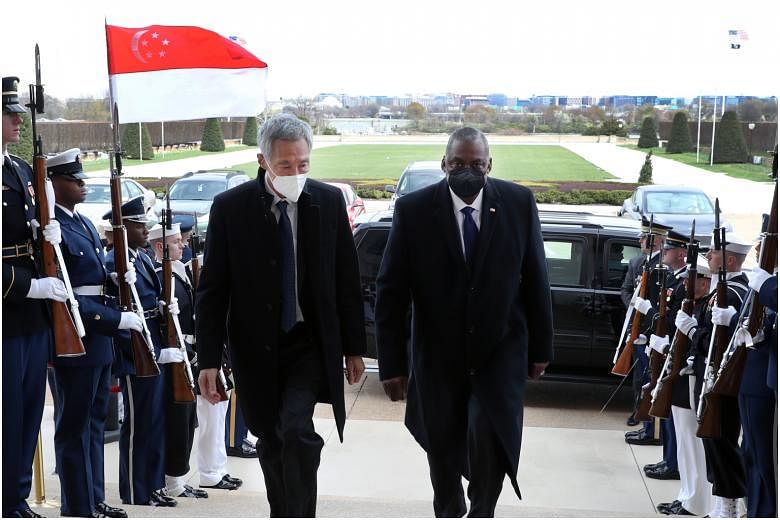
Prime Minister Lee Hsien Loong met United States Defence Secretary Lloyd Austin on March 28, 2022. PHOTO: MINISTRY OF COMMUNICATIONS AND INFORMATION

Charissa Yong
US Correspondent
UPDATED
Mar 30, 2022
WASHINGTON - Prime Minister Lee Hsien Loong and United States Defence Secretary Lloyd Austin on Monday (March 28) reaffirmed the defence ties between their countries and the importance of America's presence in the Asia-Pacific region.
They also discussed Russia’s attack on Ukraine, with PM Lee explaining why Singapore took the strong stance it did and Mr Austin expressing appreciation for Singapore’s position.
Mr Lee, who is on a working visit to the US until April 2, called on Mr Austin at the Pentagon, the US Department of Defence's headquarters just outside Washington.
There, Mr Lee was welcomed by a US military honour cordon, with flag bearers carrying both the Singapore and the US national flags, and personally greeted upon arrival by Mr Austin.
Singapore and the US have excellent and longstanding bilateral defence ties, said Mr Lee, calling them key elements for the strong partnership between Singapore and the US.
“We share the belief that the US presence in the Asia-Pacific is critical to the region’s continued peace, stability and prosperity, and Singapore continues to support the US military presence in Asia,” said Mr Lee.
Mr Austin, who visited Singapore in July last year on an introductory trip to the region, said Singapore remains one of America’s most valued defence partners.
He also called Singapore’s support for US forces “an anchor of America's presence in the Indo-Pacific”, adding: “Our military cooperation has long helped to ensure security in the region.”
They also discussed international and regional developments, including Russia’s attack against Ukraine, as the largest military conflict in Europe since World War II enters its second month.
Singapore has imposed financial and trade sanctions on Moscow and banned certain goods, including electronics and computers, from being exported to Russia, taking a position stronger than most of its neighbours’ in the region.
Said Mr Lee: “When the conflict in Ukraine broke out, Singapore took a strong stand on principles, because for us, the principle that sovereignty, territorial integrity and national borders should not be violated in contravention of the UN Charter, is fundamental and existential.”
Mr Austin said the US deeply appreciates Singapore's strong statements and actions opposing Russia's invasion of Ukraine.
“(Russian leader Vladimir) Putin has greatly underestimated the world’s resolve to impose costs on Russia for its unprovoked aggression,” said the US defence chief.
He added: “Putin's war of choice underscores the need to defend freedom, a free and open international system, an Indo-Pacific region, as well as Europe.”
Singapore and the US renewed in 2019 the memorandum of understanding regarding America’s use of facilities in Singapore, which was originally signed in 1990.
The US also hosts three Republic of Singapore Air Force training detachments, with a fourth fighter jet detachment in Guam to be established around 2029.
Mr Lee said Singapore was very grateful for the support by the US of its training detachments and exercises, and noted that the two countries have continued to work closely together amid tough global challenges over the years.
“Throughout the Covid-19 pandemic, our air and naval bases, as well as our ports, remained open to port calls, transits, maintenance and repair operations,” said Mr Lee.
Mr Austin, in turn, thanked Mr Lee for Singapore’s support of America’s rotational deployments of its P-8 Poseidon aircraft and littoral combat ships.
“It's important that we have US forces training side by side with so many of your crews,” the defence chief added.
They also discussed expanding defence cooperation in areas such as cyber, artificial intelligence and joint training, said Mr Lee’s press secretary Chang Li Lin in a statement.
Mr Lee is scheduled to meet US President Joe Biden and Vice-President Kamala Harris on Tuesday.
PM Lee, Biden discuss Ukraine war's implications on Asia-Pacific and regional issues
1 of 6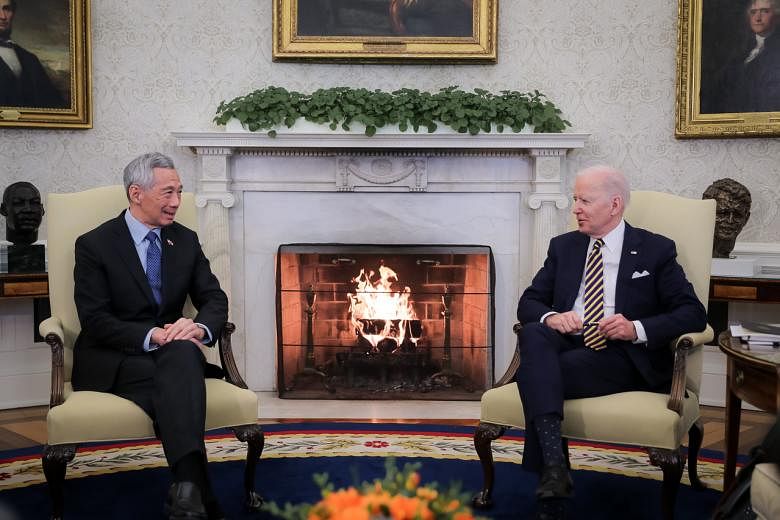
Prime Minister Lee Hsien Loong and US President Joe Biden meeting in the Oval Office, on March 29, 2022. ST PHOTO: GAVIN FOO

Charissa Yong
US Correspondent
Mar 30, 2022
WASHINGTON - The war in Ukraine has implications for the Asia-Pacific, said Prime Minister Lee Hsien Loong at a joint press conference with United States President Joe Biden on Tuesday (March 29).
"There are potential flashpoints and contentious issues in our region too, which, if not managed well, could escalate to open conflict," said PM Lee, who is on a working visit to the US.
"Countries with interests in the region need to pursue all efforts to settle disagreements through peaceful means so that we can avoid reaching a point of no return," he added, without specifying any countries.
The two leaders met for an hour at the White House, and afterwards strongly condemned the attack by Russia on Ukraine, now into its sixth week, at a press conference.
Said PM Lee: "The sovereignty, political independence, and territorial integrity of all countries, big and small, must be respected. The unprovoked military invasion of a sovereign country under any pretext is unacceptable."
He said that he and Mr Biden had discussed the measures taken by Singapore to constrain Russia's capacity to conduct war against Ukraine. They include sanctions and export restrictions.
Mr Biden said Singapore's "strong leadership in the region" made it clear that Russia's war was unacceptable to countries in every region, not just Europe.
"Today, Singapore and the United States are united in sending a message to all nations… regardless of size or population, they are equal in their rights on the global stage," he said.
"They have a right to sovereignty and territorial integrity and to determine their own future, free from violence and intimidation."
The leaders, who last met in Rome on the sidelines of the G-20 Summit in November last year, also discussed peace and stability in the Indo-Pacific, said Mr Biden.
"That includes ensuring that all nations in the region, including China, uphold the principles that enable a free and open region," said the president, adding that Singapore and the US were both committed to freedom of navigation and the unimpeded flow of maritime commerce in the South China Sea.
They also urged North Korea, which has conducted missile tests in recent months, to return to negotiations and refrain from further provocations.
Mr Biden said they had expressed deep concerns over the continuing suffering and violence in Myanmar, following last year's military coup.
"Singapore and the United States agree that the military regime must urgently implement the Asean Five-Point Consensus and return Burma to its path to democratic transition," said Mr Biden.
Asean's five point road map for Myanmar, called a "consensus", calls for an immediate cessation of violence, constructive dialogue among all parties, a special envoy to facilitate mediation and meet with all parties concerned, and humanitarian assistance.
PM Lee also met Vice-President Kamala Harris on Tuesday afternoon and will attend a dialogue at a think-tank on Wednesday. He is accompanied on his trip, which ends on April 2, by Foreign Minister Vivian Balakrishnan and Trade and Industry Minister Gan Kim Yong and Communications and Information Minister Josephine Teo.
It is obvious Sleepy Joe finds Pinky bribe under-table amount unacceptable.
Sleep Joe is the salesman for the military complex arms makers selling more arms to Loong administration.... the rich buyer... where got time to see this tiny nipple of the Asean body at the bottom of the peninsula of East Asia if not for arms sales...PM Lee, Biden discuss Ukraine war's implications on Asia-Pacific and regional issues
1 of 6

Prime Minister Lee Hsien Loong and US President Joe Biden meeting in the Oval Office, on March 29, 2022. ST PHOTO: GAVIN FOO

Charissa Yong
US Correspondent
Mar 30, 2022
WASHINGTON - The war in Ukraine has implications for the Asia-Pacific, said Prime Minister Lee Hsien Loong at a joint press conference with United States President Joe Biden on Tuesday (March 29).
"There are potential flashpoints and contentious issues in our region too, which, if not managed well, could escalate to open conflict," said PM Lee, who is on a working visit to the US.
"Countries with interests in the region need to pursue all efforts to settle disagreements through peaceful means so that we can avoid reaching a point of no return," he added, without specifying any countries.
The two leaders met for an hour at the White House, and afterwards strongly condemned the attack by Russia on Ukraine, now into its sixth week, at a press conference.
Said PM Lee: "The sovereignty, political independence, and territorial integrity of all countries, big and small, must be respected. The unprovoked military invasion of a sovereign country under any pretext is unacceptable."
He said that he and Mr Biden had discussed the measures taken by Singapore to constrain Russia's capacity to conduct war against Ukraine. They include sanctions and export restrictions.
Mr Biden said Singapore's "strong leadership in the region" made it clear that Russia's war was unacceptable to countries in every region, not just Europe.
"Today, Singapore and the United States are united in sending a message to all nations… regardless of size or population, they are equal in their rights on the global stage," he said.
"They have a right to sovereignty and territorial integrity and to determine their own future, free from violence and intimidation."
The leaders, who last met in Rome on the sidelines of the G-20 Summit in November last year, also discussed peace and stability in the Indo-Pacific, said Mr Biden.
"That includes ensuring that all nations in the region, including China, uphold the principles that enable a free and open region," said the president, adding that Singapore and the US were both committed to freedom of navigation and the unimpeded flow of maritime commerce in the South China Sea.
They also urged North Korea, which has conducted missile tests in recent months, to return to negotiations and refrain from further provocations.
Mr Biden said they had expressed deep concerns over the continuing suffering and violence in Myanmar, following last year's military coup.
"Singapore and the United States agree that the military regime must urgently implement the Asean Five-Point Consensus and return Burma to its path to democratic transition," said Mr Biden.
Asean's five point road map for Myanmar, called a "consensus", calls for an immediate cessation of violence, constructive dialogue among all parties, a special envoy to facilitate mediation and meet with all parties concerned, and humanitarian assistance.
PM Lee also met Vice-President Kamala Harris on Tuesday afternoon and will attend a dialogue at a think-tank on Wednesday. He is accompanied on his trip, which ends on April 2, by Foreign Minister Vivian Balakrishnan and Trade and Industry Minister Gan Kim Yong and Communications and Information Minister Josephine Teo.
Russia's invasion of Ukraine raises 'awkward questions' for China: PM Lee
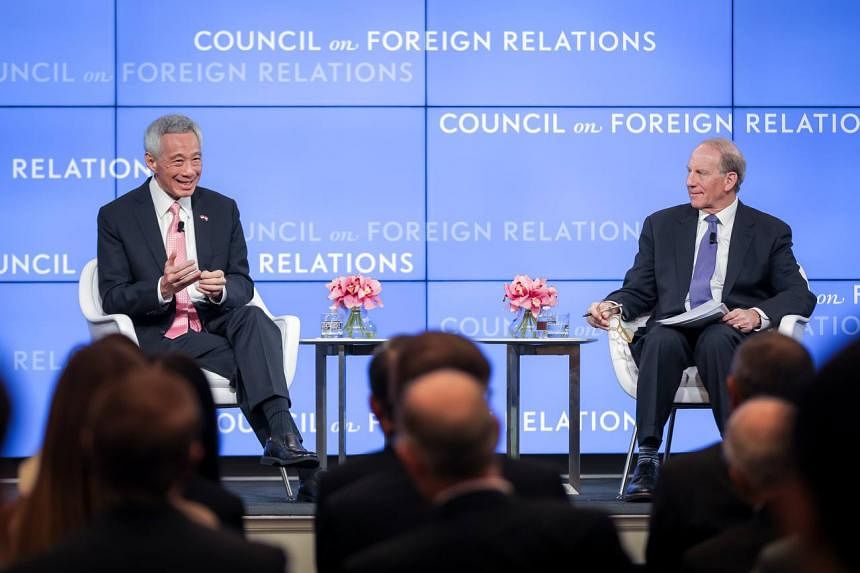
Prime Minister Lee Hsien Loong at a dialogue session presided by Council on Foreign Relations president Richard Haass on March 30, 2022. ST PHOTO: GAVIN FOO

Charissa Yong
US Correspondent
Mar 31, 2022
WASHINGTON - Russia's invasion of Ukraine has raised some "awkward questions" for China, given the attack's violation of territorial integrity and sovereignty, Prime Minister Lee Hsien Loong said at a dialogue on Wednesday (March 30).
He was asked by the dialogue's moderator, Council on Foreign Relations president and former veteran US diplomat Richard Haass, for his views on whether the Russian invasion of Ukraine had been a "sobering experience" for China.
PM Lee replied: "It violates the principles which the Chinese hold very dearly: territorial integrity and sovereignty, and non-interference.
"If you can do that to Ukraine, and if the Donbass (region) can be considered to be enclaves, and maybe republics, what about Taiwan? Or other parts of non-Han China? So, that is a very difficult question."
China stresses that Taiwan, which it regards as a renegade province to be reunited with, is an internal matter of sovereignty.
It also holds a similar position when criticising Washington's positions on other controversial issues, such as Uighur Muslims in Xinjiang.
The sanctions have also underscored how interrelated the world's economies are with one another, said PM Lee, who is in the United States on a working trip until Saturday.
"Any one of us, especially the bigger ones, can pull the house down… we are all dependent on one another," said PM Lee, citing as an example how one country may own a lot of US treasury bonds, but should Washington decide to freeze those accounts, that will have practical economic consequences.
Conversely, the US is also economically interdependent with China, one of its biggest trading partners and a manufacturing base for many US companies, he said.
"If those links fracture, it is going to hurt you too. It doesn't mean that you won't end up in a bad spot. But it does mean that both sides know the price is very high," said PM Lee.
Singapore has strongly condemned the invasion on principle and imposed sanctions and export restrictions on Russia, but it is so far the only South-east Asian country to do so.
On Wednesday, PM Lee said he did not think that Beijing is paying a political price in the Asia-Pacific for not distancing itself from Moscow.
While countries in the region might worry about the implications on their sovereignty and the principles of the UN Charter, they also want to preserve their ties with China. Quite a few countries have significant ties with Russia as well, PM Lee added.
A journalist in the audience asked PM Lee "if the Biden administration had accepted your preferred role as Beijing whisperer".
PM Lee said with a laugh: "I am not a Beijing whisperer."
Asked if he could be, he replied: "No, we cannot. We are not part of the family.
"We are an ethnic Chinese majority country in South-east Asia - multiracial, multi-religious, with independent national interests and priorities, and they treat us as such."
He added: "And we remind them that that is so."
PM Lee was also scheduled to separately meet House Speaker Nancy Pelosi, Federal Reserve chairman Jerome Powell and National Security Adviser Jake Sullivan on Wednesday afternoon.
Not as awkward as a gu-niang man marrying a manly-looking woman.
China, Solomon Islands agree controversial security pact: Official
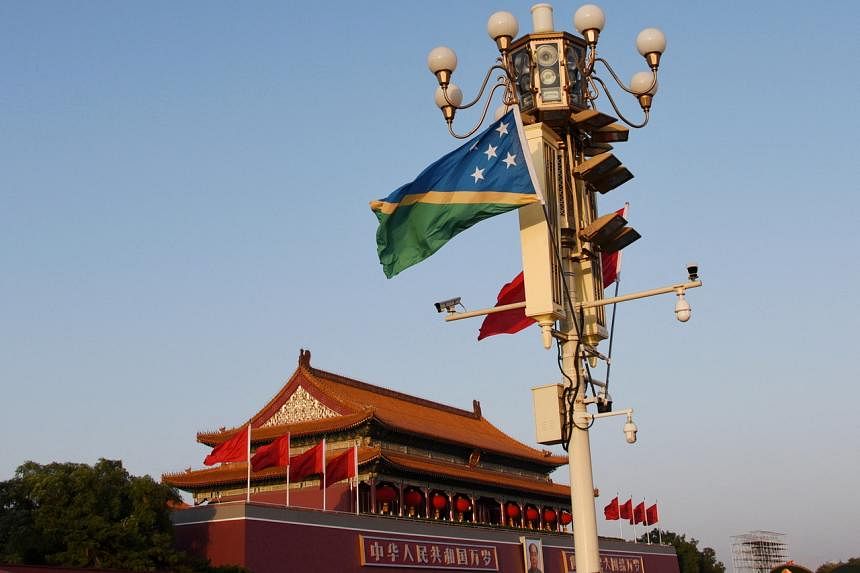
The Solomon Islands said it had inked a wide-ranging security pact with China. PHOTO: REUTERS
Mar 31, 2022
HONIARA (AFP) - The Solomon Islands on Thursday (March 31) said it had inked a wide-ranging security pact with Beijing, an agreement Western allies fear will pave the way for a first Chinese military foothold in the South Pacific.
"Officials of Solomon Islands and the People's Republic of China have initialled elements of a bilateral Security Cooperation Framework between the two countries today," said a statement from the prime minister's office in Honiara.
The Solomon Islands confirmed last Friday it was creating a partnership with China to address security threats and ensure a safe environment for investment as part of a diversification of its security relations.
Australia and New Zealand had expressed their concern about the impact on regional security of military cooperation between China and the Solomon Islands after a draft document outlining proposed cooperation was leaked last week.
A security pact would be a major inroad for China in a region that US allies Australia and New Zealand have for decades seen as their "back yard".
The security pact with China would match one the Solomon Islands has with Australia that allows for the deployment of armed forces.
The Australian security treaty was signed before Solomon Islands switched diplomatic recognition from Taiwan to Beijing in 2019.
The potential for Chinese military vessels to be based in Australia's neighbourhood has sparked alarm in Canberra, which clashed verbally with Beijing last month after a Chinese navy ship passing through Australia's northern economic exclusion zone aimed a laser pointer at an Australian surveillance plane.
The fucking cuntry lies on the earthquake zone Pacific "ring of fire". Just a matter of time before a big one decimates that whole fucking island.
Two old men crossing legsSingapore hopes United States will deepen ties with Asia-Pacific: PM Lee
1 of 6

Prime Minister Lee Hsien Loong (left) and US President Joe Biden at a press conference in the White House, on March 29, 2022. ST PHOTO: GAVIN FOO
View attachment 139809

Charissa Yong
US Correspondent
Mar 30, 2022
WASHINGTON - Singapore hopes that the United States, amid its many preoccupations, will continue to deepen its relationship with countries in the Asia-Pacific, Prime Minister Lee Hsien Loong said on Tuesday (March 29) during his meeting with US President Joe Biden.
President Biden said that even as his administration addresses the ongoing Ukraine crisis, it is committed to implementing its Indo-Pacific strategy, and he is looking forward to hosting Asean leaders in Washington for a special summit soon.
"Singapore deeply appreciates President Biden's leadership in strengthening US engagement of the region," said PM Lee.
"We welcome his intention to host an Asean-US Special Summit here soon. It's a strong affirmation of US commitment to South-east Asia and to Asean centrality."
Speaking to reporters at the start of their meeting at the White House, both leaders discussed America's commitment to the Asia-Pacific and acknowledged that their meeting came amid a critical moment in world affairs, with Mr Biden calling Russia's invasion of Ukraine an urgent threat to both Europe and the Indo-Pacific.
"It's attacking the core tenets of the rules-based international order, (that) borders can't be changed by force, and all nations large and small are equal and sovereign," said President Biden.
He thanked PM Lee for Singapore's "principled leadership in supporting the people of Ukraine", a reference to the sanctions and export restrictions that Singapore has imposed on Moscow to constrain Russia's capacity to conduct war against Ukraine.
"I know it's not easy, but I want to thank you for it. You're a man of principle and you've stepped up every time you had to," said Mr Biden, adding later that Singapore punched way above its weight.
Mr Biden reaffirmed America's commitment to the region, while PM Lee said he hoped the US could substantially deepen its relationships with Asean countries and others, including China.
In doing so, the US would foster the peace, stability and security of the region, as it has done since World War II, he added.
He said that the relationship between the US and Asean is "an engagement which is important to the US because it helps the US to be present in the Asia-Pacific, and to deepen its relations with many friends, and to strengthen its strategic interests in the region".
The two leaders also praised the strength of defence and economic ties between their two countries, with PM Lee noting Singapore's status as America's only Major Security Cooperation Partner.
"Singapore is a very good partner of the United States," said PM Lee, who wore a lapel pin with the US and Singapore flags on it. "Our relations are doing very well, economically as well as in the security and defence realms. And they prosper and grow and venture into new areas, continually."
The Prime Minister's Office said both leaders reaffirmed the robust, enduring and multifaceted Singapore-US partnership and welcomed new areas of cooperation, including in infrastructure development, cyber security and space.
"PM Lee welcomed President Biden's strong commitment to engage the region and Asean. Both leaders exchanged views on international and regional developments, including the crisis in Ukraine, and reaffirmed their shared commitment to a stable, rules-based global order," it added.
At a joint press conference after the meeting, PM Lee said Singapore is a staunch supporter of international law and the United Nations Charter, which prohibits acts of aggression against a sovereign state, and this is why it has strongly condemned the unprovoked attack by Russia on Ukraine.
"The sovereignty, political independence, and territorial integrity of all countries, big and small, must be respected. The unprovoked military invasion of a sovereign country under any pretext is unacceptable," he said.
"Our actions are based on the principles that are fundamental to our survival and existence as an independent sovereign nation. We have upheld these principles, and voted in accordance with them at the UN, in successive crises over many decades, involving different countries," he added.
US-China ties face difficult issues, important to manage differences peacefully: PM Lee
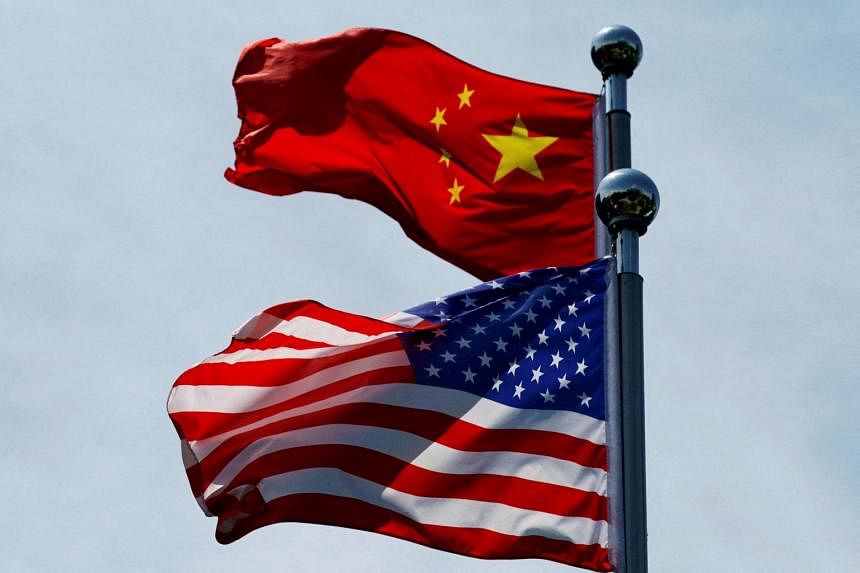
Prime Minister Lee Hsien Loong said he hopes the US and China will be able to manage their differences peacefully. PHOTO: REUTERS

Charissa Yong
US Correspondent
Apr 2, 2022
NEW YORK - The United States and China have a fraught relationship, with challenges lying in the way of them working through their difficult issues, Prime Minister Lee Hsien Loong said on Friday (April 1).
But he hopes that they will be able to talk about and manage their differences peacefully, so that countries in the Asia-Pacific can continue to prosper.
PM Lee, who spoke to Singapore reporters on Friday at the end of his working visit to the US, said that Washington is thinking ahead about how to manage the Ukraine crisis, particularly in relation to its relationship with Beijing.
The war in Ukraine will affect their ties, said PM Lee, but added that he believed neither would want the relationship to worsen over Ukraine.
"The issues are difficult. The communication channels, I think they exist, but I am not sure whether they are up to the very demanding subjects which need to be discussed," he said of the US-China relationship.
PM Lee also gave his take on the direction the US, which he last visited in September 2019, appears to be headed.
"There is a certain continuity in basic attitudes in the US administration, in the House, in Congress, as well as in the population, because mutual trust and confidence is lacking, and that is a very difficult problem to overcome. But it is something which they are very seized with," he said.
"I hope that it will be possible to make things gradually turn in the right direction."
The Prime Minister also said he doubted the war in Ukraine would be the last such conflict.
The Asia-Pacific region has had 50 years of peace in which the region's countries could develop, cooperate and compete peacefully, but whether it will have 50 years more of such peaceful coexistence is hard to say, he added.
"We can't think that it happens naturally," he said, making the case for the importance of an international framework in which every country can survive, develop, compete and work together.
A very important factor is the US-China relationship and whether the superpowers can manage their differences peacefully, said PM Lee.
The ability to talk frankly about some of their differences would enable them to maintain long-term and stable bilateral ties, so that the world - and the Asia-Pacific region especially - can benefit and take care of its own livelihood and future, he added.
Similar threads
- Replies
- 11
- Views
- 712
- Replies
- 26
- Views
- 1K
- Replies
- 12
- Views
- 989
- Replies
- 0
- Views
- 408

